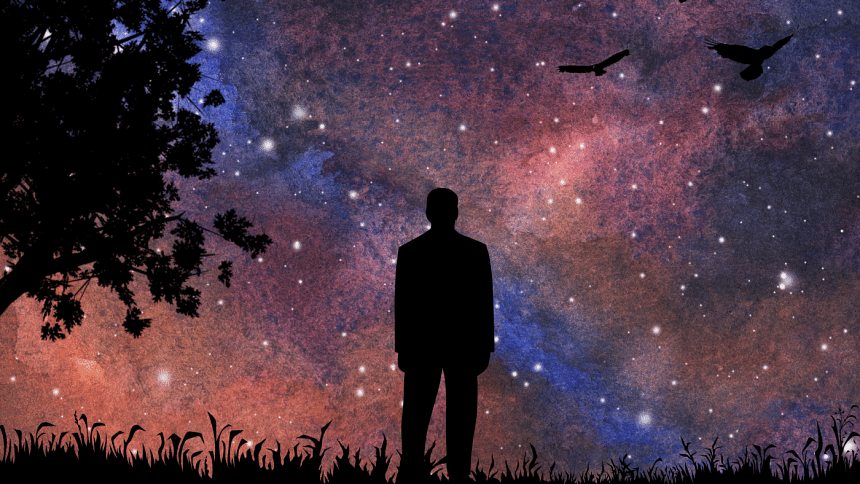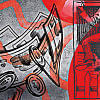Death of a novelist

I stand there, staring down keenly at Dhanmondi Lake, mesmerised by the reflection of the blackness of my soul. I rip my gaze away from it and fix it on the starless night as I liberate my fingers from the oppressive touch of paper. A small splash, and nothing else. Many eternities have to pass before I can look again, and by then, not a trace of my life's work will remain. Neither stored digitally nor on paper. Nowhere in this world, and nowhere within myself.
Gently, the breeze caresses my face, as if in consolation. But I cannot muster a shred of sadness. No tears well up. Neither is there any anger nor the smallest atom of frustration. I am a bland soup of emptiness seasoned with exhaustion.
The infallible whiteness of the walls, the omnipresent smell of disinfectants, and the fields of artificial grass come back to me. Swimming before me are visions of smiling children and the legions of overworked childcare professionals constantly at their service. Every blink threatens to permanently relocate me to their world of ceaseless laughter.
The time spent in that Youth Complex in Baridhara feels peculiarly like an afterlife to me. A heaven for the youth with neither stress nor stimulation – that's what it was. At the age of thirteen, in that world of boredom and ghosts masquerading as kids, I wrote a story that encapsulated the ennui that abandoned me. I handed it to my teacher and never got it back.
I chose literature as my undergraduate major and was utterly disgusted.
For four years, we studied the bestselling novels of the twenty-third century, only to discover that each of them had been exactly the same. Just packaged a little differently, that's all. Stories that had nothing to say yet never failed to make money. Identical characters everyone had read of a million times yet none grew bored of. Themes and messages reused and recycled to the point where even the word "generic" felt too original a description. And yet – miraculously – they always resulted in money going to someone's bank. In class, we learned the statistics of what worked and what didn't. In exams, we would stack various tropes upon each other and let artificial intelligence predict sales and profits.
"Novels do not exist for stories to be told. They exist for books to be sold," these were the exact words our professor said on the first day of class.
The world started to crumble around that time. And as the living descended further into the pits of Tartarus, the dead sprang back to life. I began to live voraciously through the works of ancient writers from long before their craft was rendered obsolete by technology. Dickens, Orwell, Tolstoy, Tagore, Nazrul, and many others shone the light of solace into the pitch-blackness of my misery. Even the darkness of Dostoyevsky felt like a hot, humid twilight compared to the ceaseless winter that had set over my life.
Until this evening, I had worked as a Prompter at a reputable publishing company. All I had to do was construct a prompt based on an idea from the higher-ups and feed that to the office AI. Multiple fully formed novels would be ready within seconds. Afterwards, I'd just send in the one that seemed the least terrible.
"You're a genius!" exclaimed my colleagues, every other day. Unbeknownst to myself, I had become an example for others. All because my junk sold more than theirs. I made money, and I helped the corporation make money. I wore a smile at all times, spreading it around as if it were a contagion. The emptiness only expanded when I should've been perfectly happy.
I am like Kazuko from Osamu Dazai's The Setting Sun. Just as she existed to bring a child into this world, I too exist to show the world a portrait of myself and this dead utopia that I have endured for so long.
A picture painted by human emotions, not the algorithms of artificial intelligence. I want to stimulate the individual, not the economy. But even when I was emulating their novels with pinpoint accuracy, the publishers muttered the same words of rejection. In our world, storytellers are just as unnecessary as content creators are essential. My raison d'être was stripped of its worth centuries before I was born.
With uncaring leisure, the water of the lake swerves this way and that, as per the instructions of the rising wind. It goes where it is easier to go and has no thoughts of its own. Just like a certain species. I stare at the black abyss, but nothing stares back. I almost wish something did. It would take away some of the loneliness that has been hollowing me out from within.
I didn't have parents. No one does these days. The family is deemed primitive and counterproductive to building the next generation of humans. An army of degree-holding experts is far more efficient.
I had many friends, but I can't remember in the slightest what we talked about. Were we, in the end, little more than strangers selfishly humouring ourselves as we travelled along the same path? I try to remember the women I have been with over the years, but no luck again. I have muddled up their names, faces – everything.
Love is free for all. It's just that it has evaporated from the face of the earth. All diseases can be cured except sudden natural death, but neither surgery nor medicine can fill the chasm that has opened up in my chest.
Nayeem often drowns in dreams and delusions. Wake him up at [email protected]

 For all latest news, follow The Daily Star's Google News channel.
For all latest news, follow The Daily Star's Google News channel. 








Comments